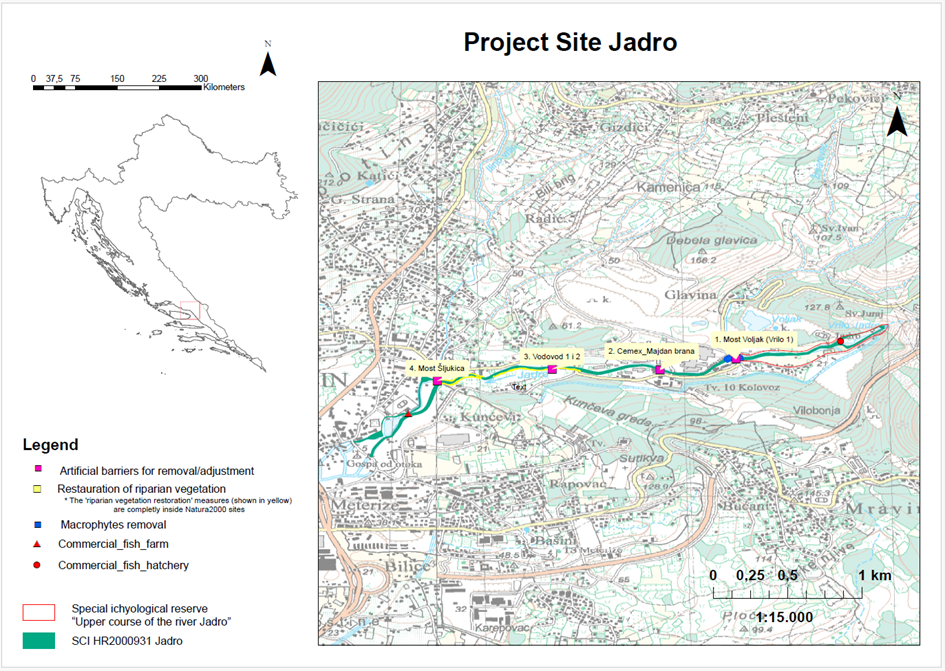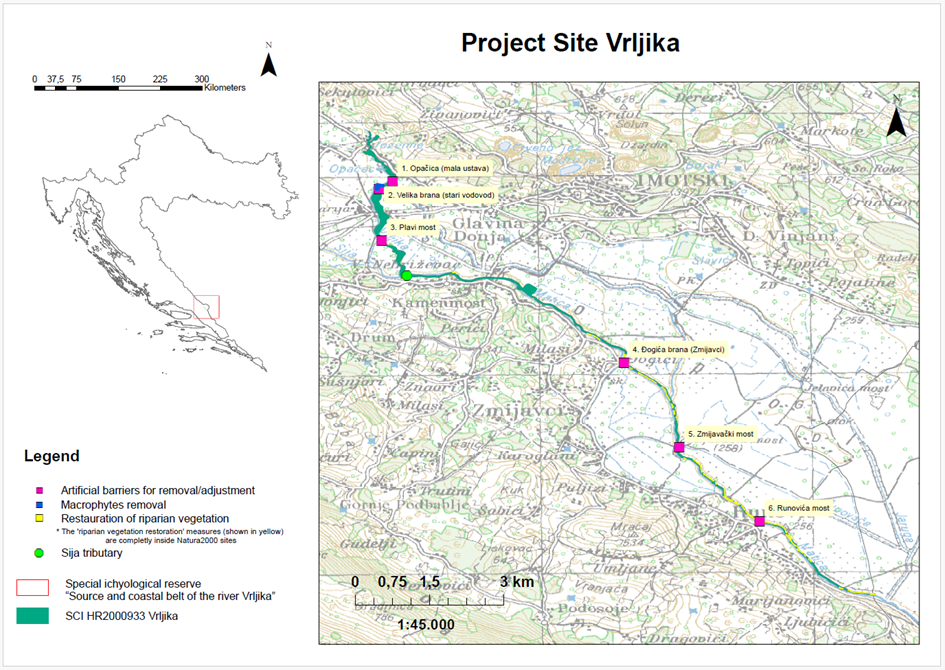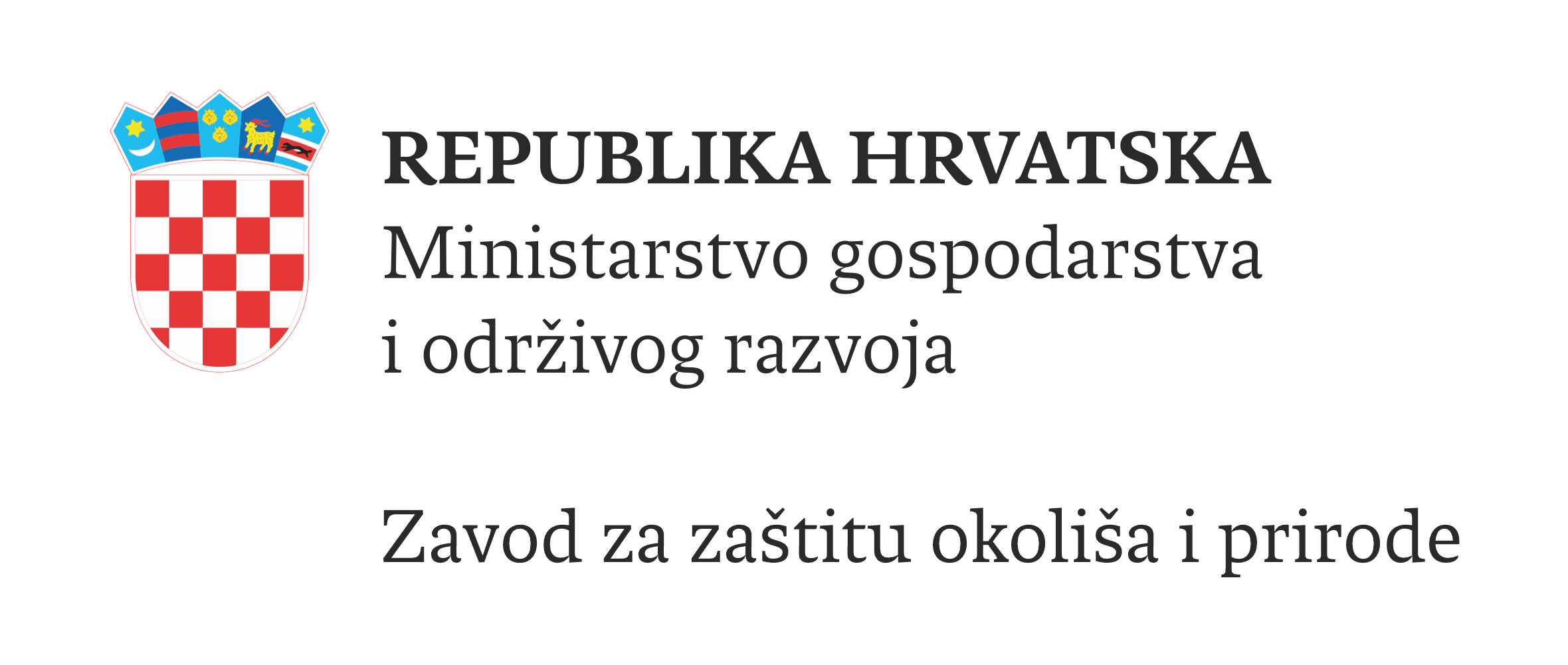About the Project
With this rather ambitious project, we are aiming to save from the brink of extinction the species soft-mouthed trout (Salmo obtusirostris), an endangered and endemic species present in the EU exclusively in Croatia. To achieve this objective, we intended to make the key improvements in the condition of specific habitat features, primarily by ensuring river connectivity in Natura 2000 sites by removing artificial barriers in the area of species distribution, in combination with other conservation measures in terms of ecological requirements of the species. Improvement of habitat conditions is crucial for improving the degree of conservation of the species on two selected Natura 2000 sites, and the improvement of species conservation status on a biogeographical level in the future. The success of the project is guaranteed through close collaboration with carefully selected project partners. Hrvatske vode (Croatian waters) is the competent authority for public water management and implementing the Water Framework Directive in Croatia. The experts from Faculty of Science focus on satisfying the conservation needs of the species as well as hydromorphological aspects of habitats improvements. The Public Institution "Sea and Karst" responsible for the management of the two Natura 2000 sites will continue with identified management activities after the project end, but from a much more favourable position to fulfil the ecological requirements of Salmo obtusirostrs and improve its conservation. The project will improve the cooperation between nature conservation and water management sectors, that will ensure an improvement of species and habitats management in the future and that will provide a foundation for significant improvement of river connectivity on national level until 2030.
Project number: LIFE22-NAT-HR-Improve River LIFE/101114250
Project acronym: Improve River LIFE
Project duration: 1. 9. 2023. - 31. 8. 2028.
Project Objectives
- To improve degree of conservation of soft-mouthed trout (Salmo obtusirostris) through improvement of river connectivity and implementation of other conservation measures in two Natura 2000 sites (Sites of Community Importance, SCIs) - HR2000931 Jadro and HR2000933 Vrljika
During the project, at least three artificial barriers limiting longitudinal river connectivity of the Vrljika and Jadro rivers will be removed/adjusted, thus re-establishing connectivity on at least 7.5 km of the Vrljika river course and at least 2 km of the Jadro river course. The other conservation measures consist of the restoration of the riparian vegetation belt with native species on an area of nearly 35 km2 which represents a buffer between the agricultural land and the rivers and helps reduce the input of nutrients and other substances from the agricultural land and the urban area, but also controls the movement of sediment and ensures the diversity of riverbed habitats. Furthermore, alien fish species will be removed and controlled through fishing, electrofishing, and blocking of pathways of introduction. The project will also include the removal of macrophyte vegetation which is the result of river course changes caused by human activities, such as slowing down, swamping, and deposition of organic matter. Since the Salmo obtusirostris populations in the Vrljika and Jadro are very small and since genetic diversity is reduced, the stability and viability of the populations will be achieved and maintained.
- To increase knowledge base and assess impact of barriers on Natura 2000 target species and habitats and prioritize removal/adjusting of barriers
The project will develop the Map of barriers in river ecosystems in Croatia, the list of priority sites for restoration through the removal or adjustment of barriers, as well as the Guidelines for improvement of degree of conservation of species and habitats in Natura 2000 sites by supporting river ecosystem connectivity as an important element for the replication and exploitation of project results in the future.
- To support conservation of Natura 2000 target species and habitats through sustainability, replication, and exploitation of project results
Numerous activities are planned within the project to raise awareness about the risk to Salmo obtusirostris and the importance of continuous river course to improve the conservation of species and habitats, to engage the local community in agriculture, fishing, aquaculture, as well as the wider public, to disseminate the obtained results, to train the stakeholders, and to exchange the acquired knowledge. In that way, the local population as well as the general public will be involved in sustainable management of natural resources, the restoration of habitats, and the conservation of Salmo obtusirostris.
- To monitor the impact of the improved river connectivity, alien species removal and populations augmentation on the degree of conservation of Salmo obtusirostris and of the socio-economic impact of the project implementation
Monitoring of changes in hydro-morphological conditions after the implemented activities, of physico-chemical parameters, the abundance of alien species populations, the distribution, status, diversity and viability of Salmo obtusirostris, and the migration of Salmo obtusirostris individuals.
- To raise awareness about Natura 2000, communicate project objectives and results, ensure LIFE visibility and networking
The development and use of communication tools and promotional materials will raise public awareness about the LIFE Programme and the EU support, the Natura 2000 network, and the importance of this project for improving the status of target and endangered species, the importance of river connectivity for the improvement of the degree of conservation of species and habitats, and disseminate information about the project and its results to experts and the wider public.
Project Area
The project is implemented on two rivers of the Adriatic basin in the Split-Dalmatia County, the Vrljika (HR2000933) and the Jadro (HR2000931), covered by the Natura 2000 protected areas, containing some of the remaining habitats of the species soft-mouthed trout (Salmo obtusirostris).
Jadro River
It springs from the strong karst spring near Solin at about thirty meters above sea level. It is a very short river, with a length of about 5 km. It flows into the Kaštela Bay. The powerful source of the River Jadro is used by the city waterworks of Split, Trogir and Kaštela. At the very source there is a dam in the function of a hydroelectric power plant and a water well. It mostly flows through an urbanized area. Along the flow, parts with and without aquatic vegetation alternate. Jadro is home to a scarce but interesting freshwater fish fauna. Only in this river lives endemic Solin soft-mouthed trout and therefore the upper part of the Jadro River was declared an ichthyological reserve in 1984.
In the fish community, soft-mouthed trout (Salmo obtusirostris) and eel (Anguilla anguilla) are characteristic and native species, while rainbow trout (Oncorhynchus mykiss) and probably brown trout (Salmo trutta) were introduced into the Jadro River. In the lower part of the stream there are numerous artificial obstacles that should be modified for the undesturbed passage of soft-mouthed trout. So far, no conservation efforts have been made on this watercourse to improve habitat conditions and preserve this target species. The threats are the impacts of the hydropower plant, invasive alien species, especially rainbow trout, and anthropogenic impacts on important habitats, especially hatcheries and habitats of soft-mouthed trout.

Vrljika River
Karst and partly underground river, which flows along the entire length of the Imotski field. It springs from several springs located in the municipalities of Proložac and Podbablje and the City of Imotski. The largest are Opačac and Utopišće, while the smaller ones are Duboka draga, Dva oka and Jauk. The total length of the flow is 70 km. On this path, it changes its name several times, so it is called Matica from Kamenmost. After that, it sinks into the abyss Šajnovac in the Herzegovinian part of the field, springs into Peć Mlini, and is called Tihaljina, Mlada and Trebižat, depending on the area through which it flows. It should certainly be pointed out that Vrljika is the most important river for the preservation of soft-mouthed trout in Croatia, and it is extremely interesting to scientists and anglers.
Along with the soft-mouthed trout (Salmo obtusirostris), the Vrljika River is inhabited by the following fish species: Spotted Minnow (Delminichthys adspersus), Imotski chub (Squalius microlepis), and Rutilus basak. Recently, unfortunately, alien species like Prussian carp (Carassius gibelio) and Northern Pike (Esox lucius) have become more and more numerous. They are translocated from the Danube basin. Occasionally, an eel (Anguilla anguilla) is recorded that comes through Matica (lower course of Vrljika) from the Neretva basin through underground karst flows and cracks. In most of its course, it is relatively good ecological condition. In the upper part of the river, a strong negative anthropogenic impact was observed, which is primarily manifested by slowing down the flow of the river by constructing barriers and dams. Due to these changes, there is an increased sedimentation of silt and organic material that covers the bottom of the river, creating the preconditions for the settlement of plant species characteristic of stagnant and slow-flowing waters that the soft-mouthed trout does not prefer.

Project Partners
Coordinating beneficiary:
The Institute for Environment and Nature within the Ministry of Environmental Protection and Green Transition is one of the central institutions within the nature protection sector in Croatia. Among other roles, the Institute is conducting professional and analytical tasks in the field of nature and environmental protection, collects and consolidates data and information on all environmental components and pressures on the environment and nature, manages and develops environmental and nature information systems, prepares analysis, reports and expert backgrounds on the state of the environment and nature, as well as expert opinions on nature conservation and sustainability of the use of natural resources, including protected areas and ecological network sites.
Partners
Croatian Waters
Croatian Waters is a legal entity for water management in the Republic of Croatia in order to protect life, health and property from the harmful effects of water and to ensure the permanent availability of water by optimizing economic and ecological benefits based on the principles of sustainable development. In the project, this institution plays a key role in the implementation of activities of removal or adaptation of artificial water barriers with the aim of improving the conservation status of soft-mouthed trout and habitats in Natura 2000 sites - rivers Jadro and Vrljika.
University of Zagreb, Faculty of Science
The Faculty of Science is one of the leading regional university institutions for scientific and educational work and expertise in the fields of natural sciences and mathematics in the Republic of Croatia. Appropriate university studies and scientific research programs are designed and implemented at the Faculty, that are an indivisible part of the higher education process in the fields of biology, physics, geophysics, geography, geology, chemistry and mathematics. Experts from the Department of Biology and Geographics are participating in this project. They are involved to monitor the hydromorphological condition, physical-chemical parameters and the condition of the soft-mouthed trout populations in the Jadro and Vrljika rivers.
The public institution „Sea and Karst“
The public institution „Sea and Karst“ performs the activity of protection, maintenance and promotion of protected areas and ecological network sites of the Split-Dalmatia County in order to protect and preserve the authenticity of nature, ensure the undisturbed development of natural processes and sustainable use of natural resources, as well as supervision of the implementation of conditions and measures for nature protection in the protected areas it manages. The Natura 2000 ecological network sites HR2000931 Jadro and HR2000933 Vrljika, which are designated as project areas for the removal or adaptation of artificial barriers in watercourses, are managed by the Public Institution and are therefore a key partner in the implementation and supervision of project activities carried out on the field.
Funding
Total project budget: 4.736.406,36 €.
EU co-financing: 3.552.302,00 €
EPEEF co-financing: 344.929,43 €
Project duration: 1. 9. 2023. - 31. 8. 2028.
The Improve River LIFE project is funded through the LIFE programme of the European Union. The national co-financing of the project is provided by the Environmental Protection and Energy Efficiency Fund and partner institutions.
The LIFE programme is the only EU funding programme dedicated entirely to environmental, climate and energy objectives. It thoroughly supports the goals of European Green Deal in its transformation of the EU into a modern, resource-efficient and competitive economy, ensuring no net emissions of greenhouse gases by 2050 and economic growth decoupled from resource use. The Programme also funds activities in the areas of protection, conservation and strengthening of the EU’s natural capital as well as protection of citizens’ health and wellbeing from risks and impacts related to environment and climate. The special focus is on the protection of habitats, and on the projects that will contribute to the implementation of the objectives of the Birds and Habitats Directive.
The Environmental Protection and Energy Efficiency Fund (EPEEF) is the central institution for collecting and investing extra budgetary resources in the programmes and projects of environmental and nature protection, energy efficiency and use of renewable energy sources, as well as for the organization of the management system for special categories of waste, all with the aim of building an environmentally sustainable society based on low-carbon development.
Links
Institutions and projects that can be linked to our project, other useful links
Platform for locating artificial barriers on watercourses
Institutions
Environmental Protection and Energy Efficiency Fund
Josip Juraj Strossmayer Water Institute
Croatian Sport Fishing Federation
Local Action Group "Cetinska Krajina"
Projects
AMBER - Adaptive Management of Barriers in European Rivers
ReMiBar - Remediation of migratory barriers in Nordic/fennoscandian watercourses
LIFE WADER - Water and Disturbance Environmental Restoration on the Northumberland coast
LIFE CONNECTS - River connectivity, habitats and water quality towards restored ecosystem services
LIFE RESQUE ALPYR - Restoration of aquatic ecosystems of protected areas from the Alps and Pyrenees
LIFE RESTORE for MDD - Preserving and restoring floodplain forest habitats along the Mura-Drava-Danube rivers
LIFE GrayMarble - Conservation and management of marble trout and adriatic grayling in the Dora Baltea catchment
WISEDRAVALIFE - Wise Water Management for the Conservation of Riverine and Floodplain Habitats along the Drava River
LIFE Minnow - Small fish, small streams, big challenges: conservation of endangered species in tributaries of the upper Po river
LIFE Blue Belt Danube-Inn - LIFE Blue Belt Danube-Inn - Supporting ecological connectivity by linking Natura 2000 areas along a blue corridor
4 Rivers for LIFE - Restoration of freshwater features in four SAC rivers in Wales: Afon Teifi, Afonydd Cleddau, Afon Tywi and River Usk


